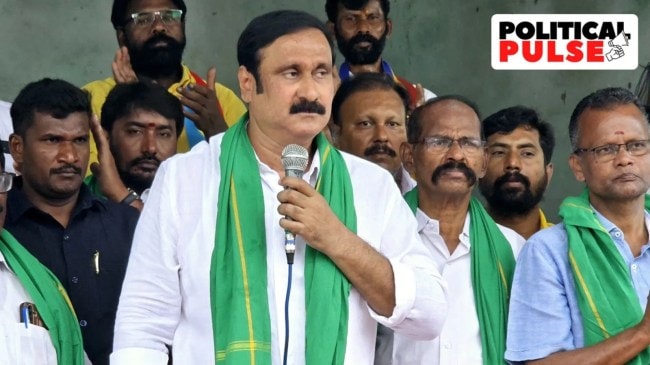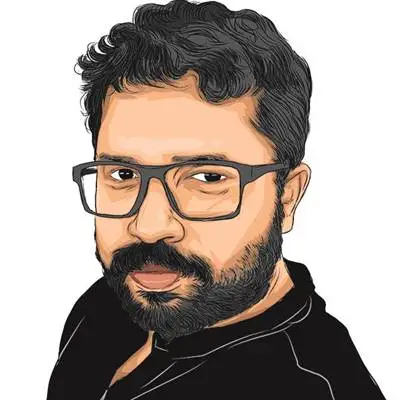For Tamil Nadu polls, PMK zeroes in on Vanniyar sub-quota to rally its base
The party, now led by S Ramadoss and his son Anbumani, rose on the back of the Vanniyar reservation movement in the 1980s and was granted Most Backward Class status. Now, the community wants 10.5% internal reservation.
 “We met the Chief Minister so many times. He welcomed us and assured us he would implement reservation,” said PMK president Dr Anbumani Ramadoss.
“We met the Chief Minister so many times. He welcomed us and assured us he would implement reservation,” said PMK president Dr Anbumani Ramadoss. In a show of strength, the Pattali Makkal Katchi (PMK) has warned the DMK-led Tamil Nadu government of “extensive and historic protests” over its failure to implement 10.5% internal reservation for the Vanniyar community.
“If 2,000 (Vanniyar) youth manage to canvass 50 votes each in a constituency, we can win in at least 50 Assembly seats,” PMK founder Dr S Ramadoss said at the once-in-12-years Chithirai Muzhu Nilavu Vanniyar Youth Conference near Mamallapuram on Sunday.
“But I know many are not working hard. Your work is being monitored. If you want to do real estate business, please do it. But you won’t have your position in the party,” he said.
Frustration about the DMK government’s failure to secure internal reservation within the Most Backward Classes (MBC) quota has become a rallying cry for the PMK ahead of the Assembly elections next year.
“We met the Chief Minister so many times. He welcomed us and assured us he would implement reservation,” said PMK president Dr Anbumani Ramadoss, the son of the party founder, referring to promises CM M K Stalin made in the early years of his term. “Suddenly, he changed his opinion. For two years, he assured us… This is a big betrayal,” Anbumani added.
PMK leaders insisted the state did not need to wait for a Central caste census to restore the quota. “Does the Tamil Nadu government have no power to take a caste survey?” Anbumani asked. “Then, how did your father and MGR (AIADMK founder M G Ramachandran) do it? How was the Sattanathan Commission formed by your father? And how did the Ambasankar Commission do door-to-door enumeration?”
But Sunday’s event was more than a political protest. It marked the reassertion of the PMK’s foundational strategy: street mobilisation, high-octane rhetoric, and caste solidarity. The Vanniyar Sangam’s flag was hoisted remotely by Ramadoss, followed by a drone show, documentary screenings on Vanniyar icons, and 14 resolutions, most of them echoing the long-standing demand for proportionate representation.
Among the key demands of the PMK are: a caste survey by the state government, an increase in Scheduled Caste reservation by 2%, removal of the 50% quota cap, and the creation of separate corporations for every community within the Backwad Class (BC) and MBC categories, modelled on Andhra Pradesh’s example. The resolutions also thanked Prime Minister Narendra Modi for announcing a caste census and expressed support for India’s military actions in response to the Pahalgam terror attack.
Behind the political messaging, there was a subtext of internal tension, too. Despite sharing the stage, Ramadoss and Anbumani continued their uneasy co-leadership, with speakers notably refraining from addressing either as party president.
“I will change you or I will appoint someone to remove you,” the elder Ramadoss warned from the dais, adding, “The party is because of my hard work. I did not have the money to run the party then. Now you are driving luxury cars.”
Anbumani, seated beside him, grinned. But in his speech, the former Union Minister praised his father, reminding people about Ramadoss senior’s fight for the welfare of Vanniyars for the last 45 years.
PMK’s rise and decline
This generational strain sits atop a party built on confrontation. In the 1980s, the PMK’s political rise was cemented by aggressive agitation tactics. The Vanniyar reservation movement — 20% reservation in education and state services — shut down road and rail traffic in northern Tamil Nadu. Protesters blocked highways by cutting state-owned trees along village borders, a tactic that gave rise to leaders like “Kaduvetti” J Guru (literally, “tree cutter”), now memorialised with a statue in Trichy.
A weeklong road blockade in September 1987, combined with earlier agitations and violent clashes, eventually led to the division of the OBC category into the Backward Classes and the Most Backward Classes by the DMK regime in 1989. Vanniyars were granted MBC status, ensuring them a share in the newly carved out 20% quota.
But the community’s demand for a further sub-quota never disappeared. In February 2021, just minutes before the Election Commission was to announce the Assembly poll dates, the AIADMK government passed a bill granting 10.5% internal reservation for Vanniyars, widely seen as a last-minute gambit to retain PMK in the NDA alliance. The reservation was carved from the existing MBC quota and framed as temporary, pending a caste-based census.
The move backfired as it angered other MBC groups, including Thevars and Gounders, and was eventually struck down by the Supreme Court.
The DMK, on assuming office, tried to strike a conciliatory tone. In July 2021, Stalin announced the construction of a Rs 4 crore memorial in Villupuram for Vanniyars killed in the 1987 protests.
Yet, the PMK’s track record remains marred by its fraught relationship with Dalits, especially in districts such as Dharmapuri and Villupuram, with notorious riots targeting Dalit villages and inter-caste tensions. Critics accuse the party of fanning casteism under the garb of social justice. In a 2013 public statement, Ramadoss infamously blamed Tamil cinema for inspiring Dalit boys to marry outside their caste, lamenting the plight of BC girls.
The party, founded in 1989, emerged from the embers of the anti-Brahmin and pro-reservation movements, and at present commands influence among the Vanniyars, still the largest OBC community in the state, estimated to constitute around 25% of the population.
Once a significant player in Tamil Nadu politics with 18 Assembly seats in 2006, the PMK has seen a steep electoral decline over the past two decades. From influencing alliance formations and shaping caste-based reservation debates, the party now finds itself increasingly marginalised. In 2024, it failed to win even a single seat in the Lok Sabha polls, reflecting a sharp fall from relevance and underscoring how a once-potent caste-based force has been reduced to a peripheral presence in the state’s political landscape.






